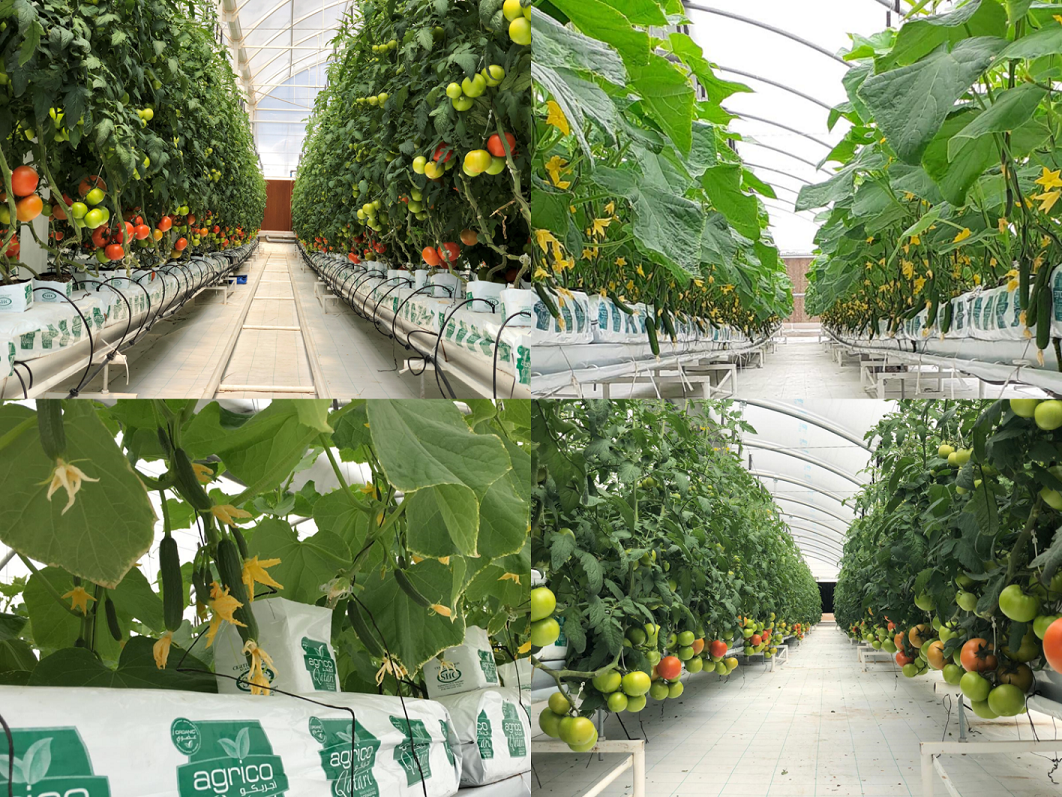A detailed report on the results of cultivation of tomatoes and cucumbers is published today after one year in operation of the Hydroponic Trial and Demonstration Center opened by Agrico, QAFCO and Yara International in February 2019. The Trial and Demonstration Center was established to test local greenhouse technologies, nutrient management and best horticultural practices. During the trials the parties have succeeded in their main objective of developing a sustainable crop management system suited for the Qatari climate with high yields and productivity while conserving precious local water resources and limiting any negative impact of vegetables production on the local environment. Click here to view the report.
The Trial and Demonstration Center’s growing Area is 3,750 square meters, situated on a plot at Agrico Farm in Al Khor. The Center was designed and built by Agrico using technology, knowledge and expertise accumulated during 10 years of experience operating in protected agriculture in Qatar. The Center is jointly operated by Agrico and Yara Agronomists while QAFCO gives full agricultural analytical support for substrate, water and leaves testing in the QAFCO Lab in Mesaieed.
All crops in the Trial and Demonstration Center are grown hydroponically, a method of growing fruits and vegetables without the use of natural soil. The crops are grown in substrate (for example coco coir, perlite, and rock wool) that is constantly fed with nutrient solutions. This way of growing reduces the risk of plants being exposed to soil diseases and allows saving of water, fertilizers and agro-chemicals.
All plants are constantly fed with nutrient solution via a drip irrigation system that precisely combines water and required nutrients. The nutrient solution is prepared from Yara’s fertilizers and is tailored for each crop and each stage of growth.
The quality of the facilities, high professionalism of the agronomists and the quality of the materials used in cultivation achieved an astonishing highest yield of 33 kg of tomatoes per square meter per year in multispan plastic greenhouse with evaporative cooling. This result is 6 times higher than the average productivity in Qatar and 50% higher than the best Qatari farmers could achieve by using the similar technologies.
Multiple training sessions and workshops were conducted at the Center for the local farming community, farm developers and industry regulators. Furthermore the Center has conducted workshops for schools and institutions who are interested to learn more about agriculture and hydroponics.
QAFCO, Agrico and Yara share the data generated during the trials including nutrient regimes, climate conditions and crop monitoring, as well as other lessons learned from the Trial and Demonstration Center, to educate and support Qatari farmers. The full report from the trials can be downloaded from Agrico and QAFCO web site.
Mr. Abdulrahman M. Al-Suwaidi, QAFCO Managing Director and Chief Executive Officer, said, “This trial and demonstration center will help develop as well as educate local farmers of the best available practices that can help them produce more while sustaining Qatar’s local resources. QAFCO is proud to contribute towards Qatar’s goal of agricultural self-sufficiency.”
AGRICO General Manager, Mr. Nasser Al-Khalaf expressed: “During the first year of the trials we have demonstrated great results, the best agronomical knowledge and cultivation practices to the local farming community. We are happy to share our experience and the lessons learned with all interested parties to contribute to the development of farming in Qatar with the goal to achieve self-sufficiency in fresh vegetable production”.
Carol Khadra, Yara’s agronomist added: “The achieved yields of more than 30 kg per square meter is a great proof to other farmers what is possible to produce in Qatar climate with application of right nutrients, fertigation methods and crop management practices. I am very proud to contribute to the success of the first year of the trial and I am aiming for better results next year”.

